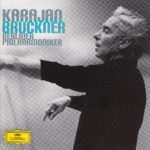 This morning’s conductor of Anton Bruckner’s Symphony No. 7 in E Major (WAB 107) is Austrian Herbert von Karajan (1908-1989), one of the most highly respected conductors – and interpreters of Anton Bruckner’s music – who ever lived.
This morning’s conductor of Anton Bruckner’s Symphony No. 7 in E Major (WAB 107) is Austrian Herbert von Karajan (1908-1989), one of the most highly respected conductors – and interpreters of Anton Bruckner’s music – who ever lived.
In fact, I compared Maestro Karajan to Tolkien’s fantasy novel Lord of the Rings on Day 56 and wrote that if Tolkien had written about the conducting world, Karajan would be the “one ring to rule them all.”
(By the way, the CD sleeve above, left, reads “8” because Symphony No. 7 in E Major is found on Disc 8 of the Karajan set.)
I first encountered the Maestro on Day 8 of my 144-day journey. On that day, he interpreted Bruckner’s First Symphony.
Then, on Day 24, Symphony No. 2.
Then, on Day 40, Symphony No. 3.
Then, on the aforementioned Day 56, Symphony No. 4.
Then, on Day 72, Symphony No. 5.
Then, most recently, on Day 88, Symphony No. 6.
 I’ve been enjoying Bruckner’s Seventh for the past week or so. I like it much more than his Sixth. So I’ve been looking forward to hearing Karajan’s interpretation of Bruckner’s Seventh, not only because it’s Karajan, but also because the orchestra is the Berliner Philharmoniker and the box set is one released by Deutsche Grammophon, one of the most prestigious labels of Classical music in the world. DG does nothing sloppily.
I’ve been enjoying Bruckner’s Seventh for the past week or so. I like it much more than his Sixth. So I’ve been looking forward to hearing Karajan’s interpretation of Bruckner’s Seventh, not only because it’s Karajan, but also because the orchestra is the Berliner Philharmoniker and the box set is one released by Deutsche Grammophon, one of the most prestigious labels of Classical music in the world. DG does nothing sloppily.
But, enough of my waxing subjective. Let’s get all the facts first. Then I’ll provide my opinion about what I’m hearing.
Bruckner’s Symphony No. 7 in E Major (WAB 107), composed 1881-1883
Herbert von Karajan conducts
Karajan used (according to the liner notes) the “Edition: Original 1883, ed. Haas”
Berliner Philharmoniker plays
The symphony clocks in at 64:37
This was recorded in Berlin, Germany, in April of 1975
Karajan was 67 when he conducted it
Bruckner was 59 when he finished composing it
This recording was released on the Deutsche Grammophon label
Bruckner wrote his symphonies in four parts. The time breakdown of this one (Symphony No. 7 in E Major, “Edition: Original 1883, ed. Haas”), from this particular conductor (Karajan) and this particular orchestra (Berliner Philharmoniker) is as follows:
I. Allegro moderato…………………………………………………………………………21:05
II. Adagio. Sehr feierlich und sehr langsam…………………………………..25:54
III. Scherzo. Sehr schnell………………………………………………………………..10:02
IV. Finale. Bewegt, doch nicht schnell……………………………………………12:25
Total running time: 64:37
According to its entry on Wikipedia,
1883 version
This was the version performed at the work’s premiere. Unfortunately it survives only in one autograph copy which includes later changes by Bruckner and others, so the exact contents of this version are lost. This version is unpublished.
This always makes me wonder what they’re using. If the “exact contents of this version are lost” and it’s “unpublished,” how are they using it as the basis for their performance?
From the liner notes on Symphony No. 7, written by Richard Osborne,
The Seventh is perhaps Bruckner’s most perfectly wrought work, his richest and most luminous utterance, written partly under the spell of Wagner’s Parsifal and Wagner’s death in Venice which is said to have inspired the slow movement’s closing threnody. The lyrical reach and maturity of the symphonic method in the two opening movements are a consistent source of wonder and these are finely balanced by the wonderfully vital Scherzo and a Finale of an almost Haydenesque terseness…
Now, the subjective aspects.
My Rating:
Recording quality: 5
Overall musicianship: 5
CD liner notes: 5 (lengthy and informative, but very heavy on the Karajan worship)
How does this make me feel: 5
As much as I enjoy rooting for underdogs or bucking the system, I have to agree with the Karajan worship in this performance.
I also agree with Richard Osborne’s assessment of the “source of wonder” about the two opening movements, especially Movement II, which – even though at 25:54 it’s very long – resolves in such a fashion that I’m left awestruck, mouth agape. That, by itself, says something. A lot of something. The only other music that holds my attention for 25 minutes is from the genre Progressive Rock – like “Supper’s Ready” from the Genesis album Foxtrot. “Supper’s Ready” is a 23-minute masterpiece literally of biblical proportions. I highly recommend it. And you can listen to it here. (You’re welcome.)
The point is listening to 23-25 minutes of music requires the music to be worthy of it. “Supper’s Ready” is worthy. So is the Adagio of Bruckner’s Seventh.
The Scherzo, which always engages me in this symphony, is energetic, fun, perhaps even playful under Karajan’s hand. It crackles with life.
Even the Finale, which hasn’t really been my favorite in Bruckner’s Seventh, is compelling, intelligent, and enormously enjoyable.
Everything about this performance is first rate.
In fact, given the informative liner notes, the caliber of the recording, and the skill of both Maestro Karajan and the Berliner Philharmoniker, I have no choice but to award this a perfect “5” across the board, in every category. I could find nothing wrong with it.
“Huzzah!”
“Huzzah!”
“Huzzah!”
“Huzzah!”
